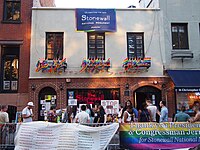
Photo from wikipedia
ABSTRACT Across history, and particularly in periods of criminalization, the gay community have often been forced to resort to public spaces—“beats”—to clandestinely seek out anonymized sex with partners who share… Click to show full abstract
ABSTRACT Across history, and particularly in periods of criminalization, the gay community have often been forced to resort to public spaces—“beats”—to clandestinely seek out anonymized sex with partners who share their sexual preference. This article reframes the construction of gay beats as ephemeral spaces that prevails in existing sexuality literature. Instead, it shows that Brisbane’s beats were semi-permanent spaces with subcultural meaning to the local gay community—a fact that was used by police to target gay men during law enforcement’s attempts to reestablish a moral order in the postwar era. Using a combination of archival material, personal narratives and secondary sources, this article effectively reframes the concept of gay beats as transitory spaces, and instead argues that it was their permanence and resilience in Brisbane’s gay subculture that made them a perfect hunting ground for police looking to target a vulnerable homosexual community.
Journal Title: Journal of Homosexuality
Year Published: 2019
Link to full text (if available)
Share on Social Media: Sign Up to like & get
recommendations!